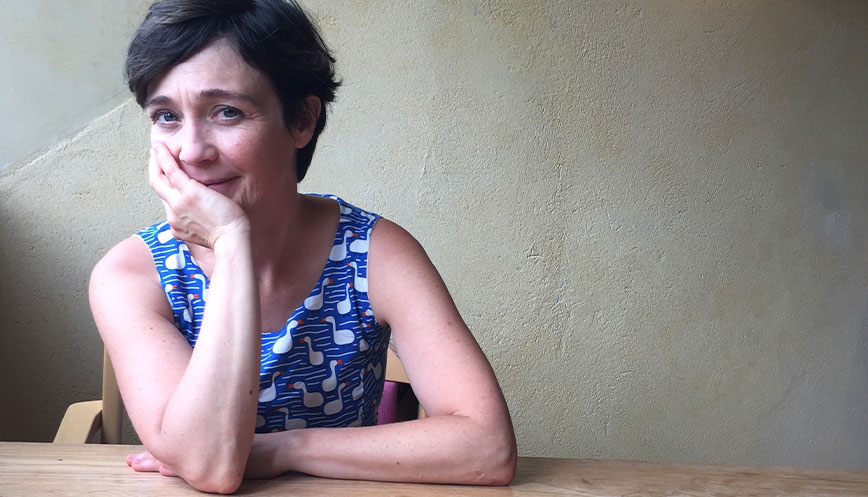Lina Rahm new assistant professor in the history of media and environment
NEW DIGITALISATION RESEARCHERS

In 2022, Lina Rahm, was appointed assistant professor in the history of media and environment at the Department of Philosophy and History/Division of History of Science, Technology and Environment/ABE school. Her specialisation is in artificial intelligence and autonomous systems.
Lina Rahm, what are your research area, interests, methods, and application area?
My research is about technological change and the correlating education of citizens. More specifically, my research seeks to understand how local and global citizens, environments, and technologies are conceptualised, controlled and governed - through education and knowledge. Education has always been a way to prepare citizens for the future.
When we think of education, we tend to think of children's schooling or higher education. However, although most adults have left those forms of education behind, adults are now, more than ever, seen as in need of new competencies and skills to be properly prepared for the future. Of course, this ambition is tightly connected to sociotechnical imaginaries and how technology is predicted to impact society at large.
In current times, AI and autonomous systems are construed as requiring certain skills- and mindsets, so much so that a new type of (desired) citizen is being construed. Importantly, this also envelops conceptualisations of the normal, and the ‘othered’, of those who need to be adjusted and those who do not.
So, my research is focused on the structural and political ways that technology, and anticipations of technology, shape the ideal citizen and what kind of inclusion/exclusion and intersecting oppression result in.
Another way to say it is:
- How does the development of AI implicate what knowledge, and in the long run, which individual, that is seen as socially desirable and environmentally sustainable?
- What new skills and competencies have been seen as necessary for citizens to face in an AI-fuelled future?
- What exactly are we supposed to learn and why?
- How is AI, and education about AI, conceptualised as a general solution to environmental, social, ethical, and economic problems?
- What historical, theoretical and practical overlaps exist between the education of citizens and AI technologies, and what future-oriented insights can be drawn from such entanglements?
The long-term aim of my research is to participate in the democratisation and epistemic justice of the diffusion of AI and other autonomous digital systems.
What do you think are the large research challenges in your research area and why?
Researchers have observed that policymakers are often experts in AI, but less so in matters of education, environmental issues, and ethics, which could mean that international policies are overlooking issues relating to societal justice, or implicitly promoting an agenda based on engineering problems and technical solutions.
This argument could be extended to a practical level, where popular education about AI is often also designed and delivered by computer scientists or experts in AI technology. Often education is even taken for granted as a common good or a neutral solution to technical problem and as such giving us reasons to explore how more complex social, environmental, ethical, and educational issues are handled on a practical level.
That is to say that the ways in which policymakers, technical innovators, researchers, and educators conceptualise, problematise, and communicate about AI and education have a clear impact on what kind of future that is imagined and what kind of citizens that are realised. Educational research on how such issues are pedagogically communicated in policies and popular education today is clearly missing.
If you are looking for research collaborators, what competence are you looking for?
My main research background is in the history of education and technology, as well as gender studies and posthuman studies. Therefore I would find it interesting to collaborate with people from any background that is different from mine really, as long as they share my interest in studies of power, and how technologies distribute power. So, don’t hesitate to contact me!
Can you tell us more about one of your research results and why you picked it?
One of my most interesting results has to do with how the Swedish worker’s movement had a huge impact on early digitalisation. This strand of research shows how technological diffusion and innovation is always already a political issue as well.
For a year, I sat in various archives and investigated the labour movement's beliefs and conflicts about automation and society's digitisation. My main result was that the broad education of citizens was seen as necessary from the mid-1950s. Back then, it was not so much about technical skills, but more that citizens needed to be trained to handle the leisure explosion that automation was imagined to bring. When computerisation was framed as a threat in the 1970s, union education became a kind of broad compromise that stopped strikes, but was also seen as a kind of investment in the workforce.
Lastly, what do you like with Sweden, Stockholm and KTH?
KTH is an incredibly exciting workplace. The high degree of internationalisation, important research and diversity of subjects makes way for many meaningful meetings.
Sweden is an interesting country in many ways and particularly when it comes to technology development, dissemination and engineering training. After World War II, Sweden gained a reputation for being one of the most modernised countries in the world. Swedish politics and the welfare state in recent decades are thus often referred to as exceptional. This refers to how Sweden's universal and generous welfare state, through redistribution of income, has succeeded in creating a high level of equality with strong institutional trust and a high level of political mobilisation based on social class.
Today, however, Sweden's exceptional days are over. Today, inequality and segregation are relatively large in Sweden. Marketisation and cutbacks have eroded the redistribution policy of the welfare state. Stockholm is a very interesting city because this change can be noticed in many concrete ways in the city.
Research in between educational and technical history